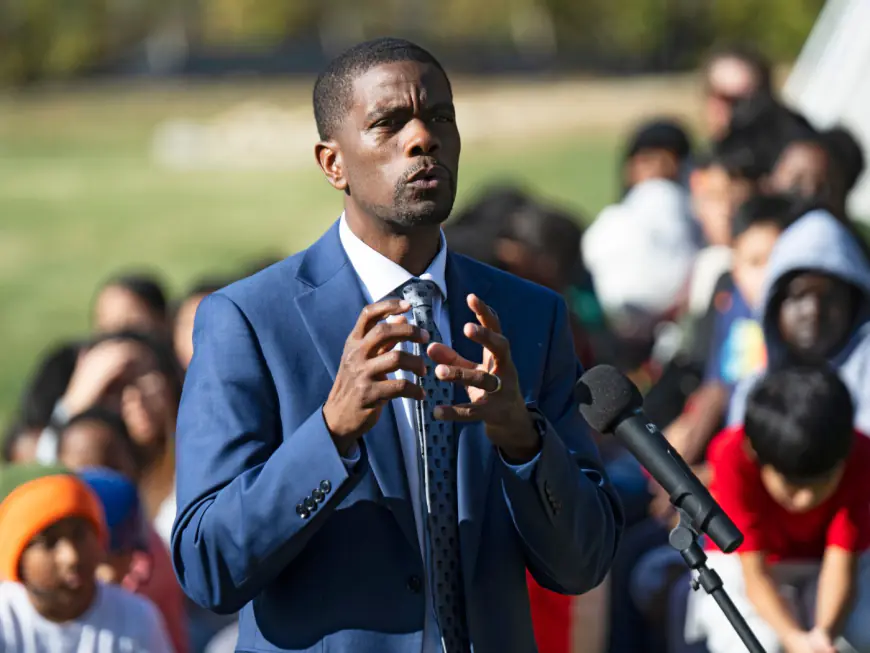St. Paul Mayor Melvin Carter announces $40 million in citywide medical debt relief via Fairview, nonprofit partnership
The mayor noted that among the insured alone, 54% of adults carry medical debt.

When St. Paul Mayor Melvin Carter announced last year he would dedicate $1.1 million in federal COVID relief aid to knock out up to $110 million in medical debt citywide, some scoffed. Why spend American Rescue Plan Act dollars helping to eliminate hard-to-collect funds that hospitals could just write off themselves?
Carter on Tuesday noted that among the insured alone, 54% of adults carry medical debt, which often forces them to delay necessary care to prioritize basic needs like housing and food. Those delays, in turn, can lead to exacerbated health issues while escalating larger financial problems.
Working with the national nonprofit Undue Medical Debt, the city has eliminated nearly $40 million in medical debt to date for 32,000 St. Paul residents.
In its first round, the mayor’s “Medical Debt Reset Initiative” effectively purchased hard-to-collect debt from Fairview Health Services for pennies on the dollar, with the average debt forgiven amounting to $268. The largest debt was nearly $105,000.
$100,000 spent to date
About $100,000 has been spent to date on the medical debt relief, including administrative costs and printed communications with recipients. More health systems are also on board with the city’s partnership with Undue Medical Debt, previously known as RIP Medical Debt.
“Fairview was just the first to make it work,” said Jennifer Lor, a spokesperson for the mayor’s office. “It’s a long process, because the debt has to be analyzed and qualify. There’s several different layers.”
The $1.1 million in funding, included by Carter in his 2024 budget proposal, was narrowly approved last December by the St. Paul City Council, which voted 4-3 to deny a request at the time by Council Member Nelsie Yang to put the spending on hold for more discussion in light of other needs, such as wage increases for city employees and downtown services for the homeless.
The mayor on Wednesday will join Undue Medical Debt Chief Executive Officer and President Allison Sesso to participate in a virtual workshop on the topic of medical debt relief as part of the “Solutions Fest” organized by the progressive journalism initiative Next City, which began Tuesday and runs through Friday.
Disproportionate impact on Black, Latino households
About 100 million Americans carry medical debt totaling some $220 billion, and many families are just one medical emergency away from facing a financial crisis, noted the mayor’s office in a written statement.
The Peterson Center on Healthcare and KFF report that 7.6% of Minnesota residents carry medical debt, and Black adults are 50% more likely and Latin adults 35% more likely than white adults to owe money for care.
Minnesota’s new Medical Debt Fairness Act bans medical debt from being reported to credit reporting agencies. The act also ensures medical providers cannot withhold medical care despite unpaid debt.
Officials with the city and the nonprofit Undue Medical Debt said they hope to partner with the state Attorney General’s office to find ways to build on the Debt Fairness Act.
How it works
The city’s initiative erases qualifying debts acquired from participating hospitals and health systems, and eligible patients will be notified soon by mail that some or all of their debts have been eliminated. Recipients do not need to take any action.
Participating health systems include Allina, HealthPartners, Fairview and Children’s Minnesota.
Health systems share information with Undue Medical Debt to get a patient’s debt cancelled — such as demographics, insurance, dates of service and amount owed — to identify which patients qualify for debt cancellation based on income. No personal health information is shared, according to the city.
To be eligible, a recipient must be a St. Paul resident, have income within 400% of the federal poverty guidelines or carry medical debt representing 5% or more of their annual household income.
What's Your Reaction?









































































































